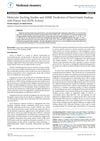 53 citations,
March 2014 in “Growth Hormone & IGF Research”
53 citations,
March 2014 in “Growth Hormone & IGF Research” IGF-1 injections help mice grow more hair by increasing cell growth and blocking a hair growth inhibitor.
 January 2024 in “Dermatologic Therapy”
January 2024 in “Dermatologic Therapy” PRP therapy with specific growth factors improves hair density and thickness in androgenic alopecia.
 1 citations,
September 2022 in “Evidence-based Complementary and Alternative Medicine”
1 citations,
September 2022 in “Evidence-based Complementary and Alternative Medicine” Gardenia florida fruit extract may help hair grow and needs more research to understand how.
 4 citations,
September 2011 in “Expert Review of Dermatology”
4 citations,
September 2011 in “Expert Review of Dermatology” Various treatments exist for alopecia areata, but none are completely satisfactory; choice depends on age, disease extent, and preference.
 25 citations,
March 2012 in “Journal of oncology pharmacy practice”
25 citations,
March 2012 in “Journal of oncology pharmacy practice” An 81-year-old man's white hair began to regain its original color while he was treated with lenalidomide, suggesting that graying hair might be reversible.
 11 citations,
March 2008 in “Experimental Dermatology”
11 citations,
March 2008 in “Experimental Dermatology” A substance called compound-1 could help increase hair growth by maintaining prostaglandin levels in hair follicles.
 127 citations,
July 2002 in “EMBO journal”
127 citations,
July 2002 in “EMBO journal” Normal skin cell renewal doesn't need RAR signaling, but vitamin A-related skin thickening does.
 18 citations,
January 2017 in “Postępy Dermatologii i Alergologii”
18 citations,
January 2017 in “Postępy Dermatologii i Alergologii” EGFR inhibitors can cause various skin issues during cancer treatment, and managing these is important for patient care.
2 citations,
November 2022 in “Oxidative Medicine and Cellular Longevity” Exosomes from dermal papilla cells help hair follicle stem cells grow and survive.
 99 citations,
July 2017 in “Clinical Reviews in Allergy & Immunology”
99 citations,
July 2017 in “Clinical Reviews in Allergy & Immunology” New treatments for Alopecia Areata show promise but need to be more effective and affordable.

Hair follicles can be used to quickly assess drug effects in cancer treatment.
 27 citations,
April 2017 in “British Journal of Dermatology”
27 citations,
April 2017 in “British Journal of Dermatology” Hair loss involves immune responses, inflammation, and disrupted signaling pathways.
 15 citations,
January 2014 in “Medicinal chemistry”
15 citations,
January 2014 in “Medicinal chemistry” Some new isatin compounds could be strong cancer-fighting drugs because they fit well in cancer-related proteins and have good drug-like properties.

PRP injections did not significantly improve hair growth in men with androgenetic alopecia.

Eclipta alba L. (Urang-Aring) can help treat hair loss.
 December 2024 in “Deleted Journal”
December 2024 in “Deleted Journal” New therapies show promise for wound healing, but more research is needed for safe, affordable options.
 May 2023 in “Clinical, Cosmetic and Investigational Dermatology”
May 2023 in “Clinical, Cosmetic and Investigational Dermatology” The research found proteins in human skin cells that help with wound healing and hair growth, which could lead to new treatments.
 17 citations,
December 2006 in “Gene Expression Patterns”
17 citations,
December 2006 in “Gene Expression Patterns” Scube3 gene affects mouse embryo growth in multiple areas, but needs more research.
 5 citations,
May 2020 in “Dermatologic Therapy”
5 citations,
May 2020 in “Dermatologic Therapy” 5-alpha reductase inhibitors might worsen lung recovery in COVID-19 patients, suggesting a pause in their use.
 15 citations,
June 2019 in “eLife”
15 citations,
June 2019 in “eLife” Activin A and follistatin control when hair cells develop in mouse ears.

Activin A and follistatin control when ear hair cells form in mice.

Activin A promotes ear hair cell development, while follistatin delays it.
 2 citations,
January 2019 in “Biomecánica”
2 citations,
January 2019 in “Biomecánica” Hyaluronic acid and versican are important for skin healing and hair growth and might help in regenerative medicine.
 54 citations,
November 2015 in “Methods in enzymology on CD-ROM/Methods in enzymology”
54 citations,
November 2015 in “Methods in enzymology on CD-ROM/Methods in enzymology” Keratins are important for skin cell health and their problems can cause diseases.
 47 citations,
April 2000 in “The American journal of pathology”
47 citations,
April 2000 in “The American journal of pathology” Bcl-2 overexpression protects against UVB damage but worsens hair loss from chemotherapy.
 165 citations,
February 2014 in “Phytotherapy Research”
165 citations,
February 2014 in “Phytotherapy Research” Myrtle has various health benefits and potential for medicine development.
 June 2023 in “Journal of cosmetic dermatology”
June 2023 in “Journal of cosmetic dermatology” Both DPCP alone and with PRP are effective and safe for treating severe alopecia areata.
 16 citations,
February 2022 in “Science Advances”
16 citations,
February 2022 in “Science Advances” Follistatin and LIN28B together improve the ability of inner ear cells in mice to regenerate into hearing cells.
 101 citations,
January 1997 in “Journal of Investigative Dermatology Symposium Proceedings”
101 citations,
January 1997 in “Journal of Investigative Dermatology Symposium Proceedings” Nerves and chemicals in the body can affect hair growth and loss.
 2 citations,
February 2019 in “bioRxiv (Cold Spring Harbor Laboratory)”
2 citations,
February 2019 in “bioRxiv (Cold Spring Harbor Laboratory)” The Asiatic lion has very low genetic diversity and unique genetic traits, highlighting the need for its conservation.





























